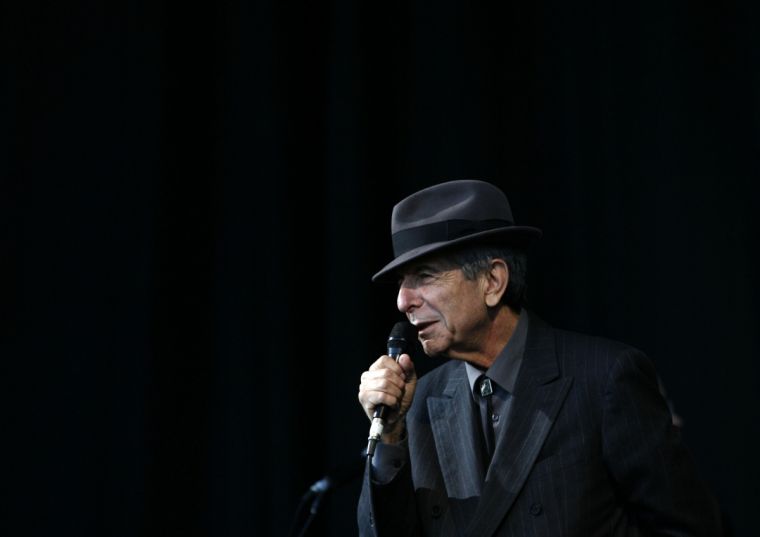Leonard Cohen Obituary: The Life And Faith Of A Musical Legend

Leonard Cohen, who has died at 82, was one of the most spiritually attuned artists of the 20th and 21st Centuries.
Born in Montreal, Canada, in 1934, Cohen became a poet and author, to limited success. By the mid 1960s and struggling for recognition, he turned to music – a decision which would bear the fruit of 14 albums, sell out tours and a place in the hearts of music fans across the globe.
His debut album Songs Of Leonard Cohen set the tone for a singular career. His music, which often seemed at first listen to be downbeat and bleak, contained gems of hope strewn throughout. From the outset, Cohen's work contained plentiful religious imagery and the exploration of spiritual themes.
In Suzanne, one of his most celebrated early works, Cohen sang of Jesus: "But he himself was broken long before the sky would open... Forsaken, almost human he sank beneath your wisdom like a stone."
This deeply spiritual dimension to Cohen's music no doubt came from his upbringing in a Jewish home. He said: "The Bible was not forced on me, I received it like honey, and I found all the stories equally beautiful, from the Creation to the Apocalypse."
This foundation never left him, whether he was writing more secular music in the mid 1970s and even while he retreated to a Buddhist monastery in the 1990s. In fact, his later work draws on Jewish and Christian scripture even more than the earlier work does. Cohen said last month: "This is a vocabulary that I grew up with – this biblical landscape is very familiar to me and it's natural that I use those landmarks as references. Once they were universal references and everybody understood and knew them. That's no longer the case today but it's still my landscape, I try to make sure that they're not too obscure."
His deep grounding in the Hebrew Bible as well as the Christian scriptures shone through time and again – not least in arguably his most famous song, Hallelujah. Virtually ignored upon release in 1984, it slowly grew in stature and was covered by everyone from John Cale to X Factor contestants. The most famous version was by Jeff Buckley, whose own untimely death lent it an extra layer of mystique.
The biblical imagery of the first few verses spills over into a more personal section which sees Cohen imagining himself face to face with God. "And even though it all went wrong, I'll stand before the Lord of Song, with nothing on my tongue but Hallelujah..."
Even his late 80s and early 90s experimentation with synthesizers reaped significant spirituality in the words. One of Cohen's most celebrated lyrics comes from Anthem – a track on 1992's The Future. "Ring the bells that still can ring, forget your perfect offering, there is a crack in everything, that's how the light gets in." It's the quote being shared on social media around the world today.
After his hiatus in the 90s, Cohen returned with Ten New Songs and Dear Heather in the early 2000s. Both were decent records, but didn't hit previous heights. It would have been fair to assume that, now in his 70s, Cohen's creative peak was behind him. How wrong that presumption would have been.
His late period in fact produced a trilogy of stunning albums, which explored mortality without being morose – in fact, there was a seam of humour running through them all. The first of these records was 2012's Old Ideas. Cohen's rich baritone was cracking, but that actually added another level of pathos to the music. In Show Me The Place, he conjoured images of Jesus' burial. "Show me the place, help me roll away the stone, show me the place, I can't move this thing alone. Show me the place where the Word became a man, show me the place where the suffering began."
2014's Popular Problems was another triumph. Again, Cohen was exploring death and faith. On Almost Like The Blues he growled: "There is no God in Heaven, and there is no Hell below, So says the great professor, of all there is to know, But I've had the invitation, that a sinner can't refuse, And it's almost like salvation, it's almost like the blues."
Finally, in the weeks before his death, he released You Want It Darker. Further steeped in the Jewish scriptures, it seemed Cohen was ready to die – even if it would be a while. In the end, it was only a matter of days after its release that we learned of his demise. On the title track he sang, "Magnified, sanctified be Thy Holy Name. Vilified, crucified in the human frame." The Christian Today review described the record as, "the best Christian album by a non-Christian I have heard."
Cohen, whose faith has never been orthodox, remained beloved of many Christians. A recent New Yorker profile gave a flavour of his continuing spiritual quest: "To this day, Cohen reads deeply in a multivolume edition of the Zohar, the principal text of Jewish mysticism; the Hebrew Bible; and Buddhist texts.
Yet Cohen never saw himself as any kind of authority. He told an audience in LA last month, "I've never thought of myself as a religious person, I don't have any spiritual strategy... I limp along like so many of us do in these relams, occasionally, I've felt the grace of another presence in my life, but I can't build any kind of spiritual structure on that."
Leonard Cohen leaves behind two children, two grandchildren and 14 albums.
Follow Andy Walton on Twitter @waltonandy











